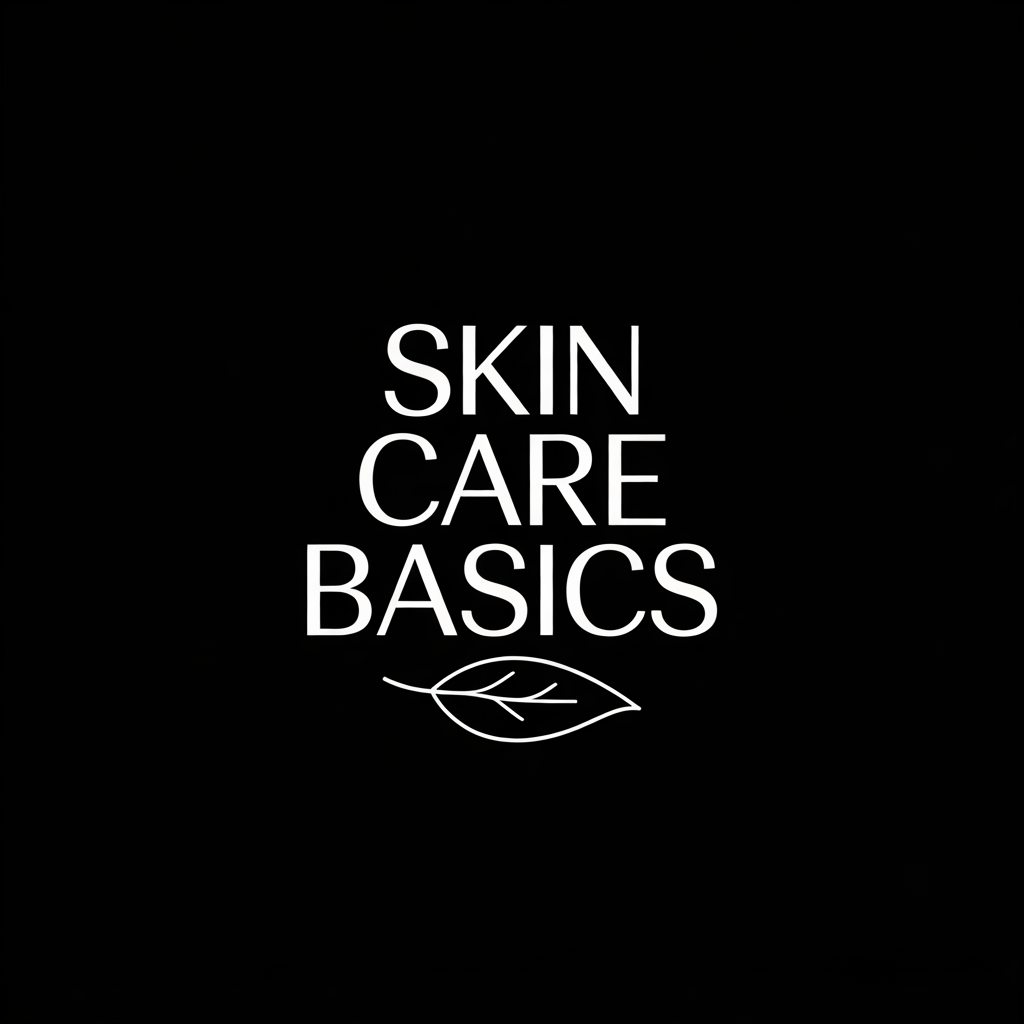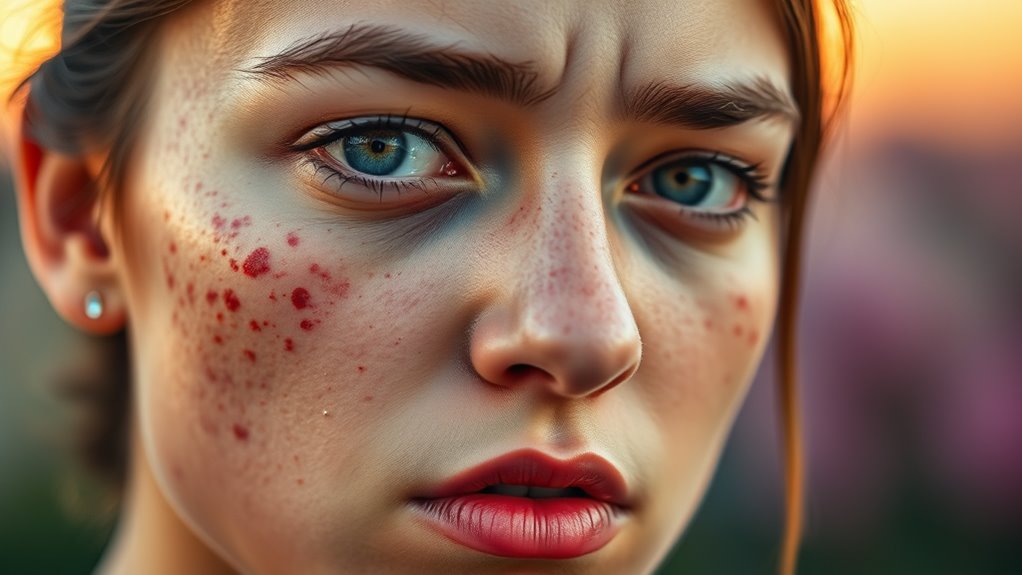Is Stress the Real Reason Your Skin Is Breaking Out.
Have you noticed more breakouts during stressful times? You’re not alone. Research shows that stress can significantly impact your skin health. Elevated cortisol levels lead to increased oil production and clogged pores, resulting in acne and irritation. Understanding how stress affects your skin is crucial. But what specific factors contribute to this connection, and how can you manage them effectively? Let’s explore the intricate relationship between stress and your skin.
Key Takeaways
- Stress elevates cortisol levels, increasing oil production and leading to clogged pores and breakouts.
- Emotional stress triggers hormonal changes that exacerbate acne and skin sensitivity.
- Chronic stress weakens the skin barrier, making it more susceptible to irritations and infections.
- Sleep deprivation from stress disrupts skin repair processes, worsening acne and dullness.
- Mindfulness and healthy lifestyle choices can help manage stress and reduce breakouts.
Understanding the Connection Between Stress and Skin Health
How does stress impact your skin health?
The stress skin connection is significant; when you’re stressed, your body releases cortisol, which can disrupt skin barrier function.
This disruption leads to increased oil production, dehydration, and inflammation.
You might notice heightened sensitivity or redness as your skin reacts negatively to stress.
Additionally, stress can impair your immune response, making your skin more susceptible to infections and irritations.
Over time, chronic stress can accelerate skin aging, manifesting as fine lines and loss of elasticity. Managing stress effectively is crucial for maintaining a healthy complexion and minimizing these adverse effects.
Understanding this connection is crucial for managing your skin health effectively and adopting strategies to reduce stress.
How Stress Triggers Acne and Breakouts
Have you ever noticed a sudden breakout during particularly stressful times?
Stress triggers acne through several mechanisms:
-
Increased Cortisol: Stress elevates cortisol levels, causing your skin’s oil glands to produce more sebum, which can clog pores.
-
Inflammatory Response: Stress activates inflammatory pathways, leading to redness and swelling in existing blemishes.
-
Immune System Suppression: Chronic stress weakens your immune response, making it harder for your body to fight off acne-causing bacteria.
Additionally, factors like unexpected triggers of acne can compound the effects of stress on your skin.
Recognizing these connections can help you manage stress more effectively and potentially reduce those unwanted breakouts.
Understanding this link is crucial for maintaining healthier skin.
The Role of Hormones in Stress-Induced Skin Issues
What happens to your hormone levels when stress hits? When you’re stressed, your body releases cortisol, which can lead to increased oil production in your skin. This excess oil contributes to clogged pores and breakouts. Additionally, stress can disrupt the balance of other hormones, like androgens, which further exacerbates skin issues. Understanding how different skin types react to hormonal changes can also provide insights into effective skincare routines.
| Hormone | Effect on Skin |
|---|---|
| Cortisol | Increases oil production |
| Androgens | Stimulates sebaceous glands |
| Estrogen | Can reduce inflammation |
| Progesterone | May worsen acne conditions |
Understanding these hormonal shifts can help you manage stress-related skin problems more effectively.
Identifying Stressors That Affect Your Skin
Identifying the specific stressors that impact your skin can be crucial for managing breakouts and other skin issues.
Here are three common stressors you mightn’t realize are affecting your complexion:
- Emotional Stress: Anxiety or frustration triggers hormonal changes that can lead to increased oil production and breakouts.
- Sleep Deprivation: Lack of sleep disrupts your skin’s repair processes, exacerbating issues like acne and dullness. Studies have shown that quality sleep significantly enhances skin health and appearance.
- Dietary Choices: High-sugar or processed foods can increase inflammation, leading to skin flare-ups.
Recognizing these triggers allows you to take steps toward healthier skin by addressing the root causes of stress.
Effective Stress Management Techniques for Better Skin
To improve your skin, effective stress management techniques are essential. Practices like mindfulness meditation, regular physical activity, and nourishing dietary choices can significantly reduce stress levels and enhance skin health. Additionally, eliminating sugar from your diet can lead to noticeable improvements in skin texture, further supporting your skin’s clarity and overall appearance.
Mindfulness Meditation Practices
How can mindfulness meditation transform your skin health?
Engaging in mindfulness practices can significantly reduce stress, leading to clearer skin.
Here are three ways it works:
- Regulates Cortisol Levels: Mindfulness meditation lowers cortisol, the stress hormone that can trigger breakouts.
- Enhances Blood Circulation: By promoting relaxation, it improves blood flow, delivering essential nutrients to your skin.
- Promotes Emotional Balance: Mindfulness helps manage anxiety and emotional eating, reducing skin-related issues.
Incorporating these practices into your routine may not only enhance your mental well-being but also lead to healthier, clearer skin over time.
Physical Activity Benefits
While you might think of physical activity primarily as a way to maintain fitness, it also plays a crucial role in stress management, which directly impacts your skin health. Regular exercise helps reduce cortisol levels and promotes endorphin release, enhancing your mood and overall well-being. Here’s how various forms of physical activity benefit your skin:
| Activity Type | Skin Benefit |
|---|---|
| Aerobic Exercise | Increases blood circulation |
| Strength Training | Reduces inflammation |
| Yoga | Promotes relaxation |
| Dance | Boosts mood and reduces stress |
| Walking | Improves skin tone |
Incorporating these activities into your routine can lead to healthier skin.
Nourishing Dietary Choices
Physical activity is just one piece of the puzzle when it comes to managing stress and promoting skin health.
Your dietary choices can significantly affect your skin’s appearance and resilience.
Consider these nourishing options:
- Omega-3 Fatty Acids: Found in fish, flaxseeds, and walnuts, they reduce inflammation and enhance skin hydration.
- Antioxidant-Rich Foods: Berries, leafy greens, and nuts combat oxidative stress, protecting your skin from damage.
- Hydration: Drinking adequate water helps maintain skin elasticity and flushes out toxins, improving overall texture.
Incorporating these foods into your diet can help mitigate stress effects and promote clearer skin.
The Importance of a Skincare Routine During Stressful Times
When life gets stressful, have you considered how a consistent skincare routine could significantly impact your skin’s health? Stress triggers hormonal changes that can lead to increased oil production and breakouts. By maintaining a daily routine, you help regulate your skin’s natural barrier, reducing the risk of irritation and inflammation. Cleansing removes impurities, while moisturizing keeps your skin hydrated, essential during stress. Incorporating targeted treatments can address specific concerns, like acne or dryness. This proactive approach not only enhances your skin’s resilience but also provides a calming ritual, helping you manage stress more effectively. Implementing a simple cleansing routine can dramatically transform your skin’s appearance and health. Your skin will thank you for it.
When to Seek Professional Help for Stress-Related Skin Problems
If you’re experiencing persistent skin issues that don’t improve with over-the-counter treatments, it’s time to seek professional help. Severe emotional distress can also manifest through skin problems, signaling a need for expert guidance. Ignoring these signs may prolong your discomfort and complicate your skin’s recovery. Additionally, a dermatologist can provide effective skincare routines that enhance your skin’s natural glow and address stress-related conditions.
Persistent Skin Issues
Persistent skin issues can be a frustrating consequence of stress, often manifesting as acne, eczema, or psoriasis.
If you notice these conditions lingering despite your efforts, it’s time to consider seeking professional help.
Here are three signs that indicate you should consult a dermatologist:
- Prolonged Symptoms: If your skin issues persist for more than a few weeks without improvement.
- Severe Reactions: Noticeable swelling, pain, or itching that disrupts daily life.
- Ineffective Treatments: Over-the-counter remedies aren’t providing relief, suggesting a deeper underlying issue.
Addressing these concerns early can lead to better management of your skin health.
Severe Emotional Distress
How can severe emotional distress impact your skin health?
Intense stress can trigger hormonal fluctuations, leading to increased oil production and inflammation, which may result in acne or other skin issues.
You might notice your skin reacting more sensitively, becoming redder or more prone to breakouts.
If you experience persistent skin problems despite using topical treatments or if emotional distress interferes with your daily life, it’s time to seek professional help.
A healthcare provider can assess your situation, recommend coping strategies, or refer you to a mental health professional.
Addressing both emotional and skin health is crucial for overall well-being.
Ineffective Home Remedies
When emotional distress leads to skin issues, many people turn to home remedies in hopes of finding relief.
However, these remedies often fall short. Consider the following ineffective options:
- Over-the-counter anti-acne products: While they may help some, they often fail to address underlying stress factors.
- DIY masks: Ingredients like honey or oatmeal lack scientific backing for treating stress-induced acne.
- Excessive washing: This can worsen irritation and disrupt your skin’s natural barrier.
If you notice persistent breakouts despite these attempts, it’s time to consult a dermatologist or mental health professional for tailored solutions.

